
|
Astronomy Picture Of the Day (APOD)
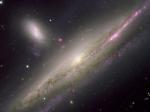 NGC 1531/2: Interacting Galaxies
NGC 1531/2: Interacting Galaxies
1.03.2005
This dramatic image of an interacting pair of galaxies was made using 8-meter Gemini South telescope at Cerro Pachon, Chile. NGC 1531 is the background galaxy with a bright core just above center and NGC 1532 is the foreground spiral galaxy laced with dust lanes.
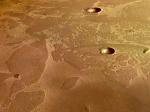 Unusual Plates on Mars
Unusual Plates on Mars
28.02.2005
What are those unusual plates on Mars? A leading current interpretation holds that they are blocks of ice floating on a recently frozen sea covered by dust. The unusual plates were photographed recently by the European Space Agency's Mars Express spacecraft currently orbiting Mars.
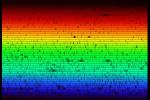 The Solar Spectrum
The Solar Spectrum
27.02.2005
It is still not known why the Sun's light is missing some colors. Shown above are all the visible colors of the Sun, produced by passing the Sun's light through a prism-like device.
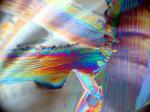 Frizion Illume
Frizion Illume
26.02.2005
Scientific images of cosmic dust clouds or even frozen water can be esthetic too. In fact, this picture of thin layers of forming ice crystals uses a scientific understanding of light's wave properties solely for artistic purposes. Titled "Illume", the picture was created by astrophysicist Peter Wasilewski.
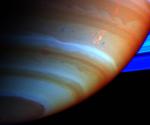 Saturn s Dragon Storm
Saturn s Dragon Storm
25.02.2005
Dubbed the "Dragon Storm", convoluted, swirling cloud features are tinted orange in this false-color, near-infrared image of Saturn's southern hemisphere. In one of a series of discoveries announced by Cassini researchers, the Dragon...
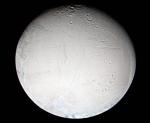 Ski Enceladus
Ski Enceladus
24.02.2005
Small, icy, inner moon of Saturn, Enceladus is only about 500 kilometers in diameter. But the distant world does reflect over 90 percent of the sunlight it receives, giving its surface about the same reflectivity as fresh snow.
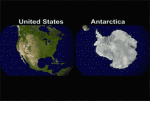 Voyage of an Antarctic Iceberg
Voyage of an Antarctic Iceberg
23.02.2005
What if part of New York broke off and slammed into New Jersey? Both being anchored land masses, that is unlikely to happen, but an event of that size scale did occur off the Antarctic coast over the last three months.
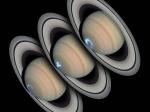 Persistent Saturnian Auroras
Persistent Saturnian Auroras
22.02.2005
Are Saturn's auroras like Earth's? To help answer this question, the Hubble Space Telescope and the Cassini spacecraft monitored Saturn's South Pole simultaneously as Cassini closed in on the gas giant in January 2004. Hubble snapped images in ultraviolet light, while Cassini recorded radio emissions and monitored the solar wind.
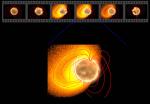 Galactic Magnetar Throws Giant Flare
Galactic Magnetar Throws Giant Flare
21.02.2005
Was the brightest Galactic blast yet recorded a key to connecting two types of celestial explosions? Last December, a dense sheet of gamma rays only a few times wider than the Earth plowed through our Solar System, saturating satellites and noticeably reflecting off the Moon.
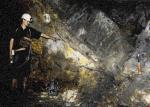 Oklo: Ancient African Nuclear Reactors
Oklo: Ancient African Nuclear Reactors
20.02.2005
The remnants of nuclear reactors nearly two billion years old were found in the 1970s in Africa. These reactors are thought to have occurred naturally. No natural reactors exist today, as the relative density of fissile uranium has now decayed below that needed for a sustainable reaction.
|
January February March April May June July August September October November December |
|||||||||||||||||||||||||||||||||||||||||||||||||